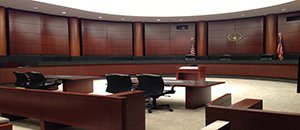AUTHOR’S NOTE: This case is from the U.S. 8th Circuit Court of Appeals and therefore establishes strong precedence, even with other Circuits. However, the staff at BlueSheepDog are not legal advisors, and strongly recommend that readers refer to their State Statutes and confer with local Prosecutors before taking action in regards to this decision.

Case Facts:
On January 6, 2006 the night manager of the Ramada Inn Hotel in Grand Forks, North Dakota, called the Grand Forks Police about a disturbance in Room 101. The manager explained to police that he had received several complaints about loud partying in that room. In addition, he told the police that he had seen many people entering and exiting the room and he suspected that illegal drug activity was taking place inside the room. The manager advised he had warned the occupants of the room to be quiet, but now he wanted the police to help with evicting them.
Two Grand Forks Police officers responded with the manager to Room 101. When they arrived to the room the officers heard loud noise and what they believed was a discussion about illegal drug trafficking. Officers confirmed that the manager wanted the occupants evicted. An officer knocked on the door and asked for permission to enter the room. A female answered the door, but refused to allow the officers to enter the room claiming it was not hers and she did not know who had rented it. Officers informed the female that hotel management wanted everyone in the room evicted, and that they were coming inside to enforce that eviction.
Upon entering the room, one officer recognized one of the male occupants as a person with outstanding arrest warrants (Molsbarger). Molsbarger appeared to be asleep on the bed. The officers handcuffed Molsbarger and searched him incident to arrest. While searching the lunge area surrounding Molsbarger the officers found a methamphetamine pipe and a butane torch in a nightstand next to the bed. Molsbarger had $940 cash on his person. At the foot of the bed officers found an empty beer box containing approximately one-half pound of methamphetamine, a small digital scale, and some marijuana. Based upon their findings and information gathered during their investigation from the others present at the scene, Molsbarger was arrested for possessing a controlled substance with intent to distribute.

U.S. District Court Findings
Due to the large amount of methamphetamine seized, Molsbarger was charged for Federal drug law violations. Molsbarger contested the seizure of the illegal drugs as a violation of his 4th Amendment rights to be free from unreasonable search and seizure. The U.S. District Court rejected Molsbarger’s petition and his case went to trial. At trial, several witnesses (who were present in the hotel room) testified that Molsbarger was providing them illegal drugs, and a DEA Agent testified that the amount of methamphetamine was consistent with narcotics trafficking. Ultimately, Molsbarger was convicted of his crimes, and appeals his conviction to the U.S. 8th Circuit Court of Appeals.
U.S. 8th Circuit Review
In determining the 4th Amendment question, the 8th Circuit looked at the reasonableness of the search and seizure. Both parties focused on the threshold question of whether Molsbarger ever had a reasonable expectation of privacy in the room. However, the 8th Circuit reasoned it is unnecessary to resolve that question, because whatever expectation of privacy Molsbarger may have had, ceased when he was justifiably evicted from the hotel.
AUTHOR’S NOTE: Knowing your State Statutes on justifiable reasons a hotel can evict is paramount to successful conclusions of calls of this nature. In my State there are several reasons a hotel may terminate the lease and evict. The most important consideration of any police action will be showing that their actions were assisting management, and not acting on their own.

The U.S. 8th Circuit Court of Appeals stated, “justifiable eviction terminates a hotel occupant’s reasonable expectation of privacy in the room. (United States v. Rambo, 789 F.2d 1289, 1295-96 (8th Cir.1986), and (United States v. Allen, 106 F.3d 695, 699 (6th Cir.1997) “Once ‘a hotel guest’s rental period has expired or been lawfully terminated, the guest does not have a legitimate expectation of privacy in the hotel room.” (quoting United States v. Rahme, 813 F.2d 31, 34 (2d Cir.1987)).
If your State law allows for unruly tenants to be evicted, the officers assisting with that action are covered under the law. The pivotal point is that the officers must show they were simply “assisting” in the proper eviction, and that they did not act on their own. To accomplish this, the employee of the business must be present during the eviction, and not just police officers acting alone on behalf of the employee or business.
The U.S. 8th Circuit Court of Appeals recognized that a person cannot expect or claim a right of privacy in an area where their actions have lawfully caused them to be evicted. Hotels have a very special place in statutory law, because they are places of temporary residence, but do not have the full rights of privacy as a permanent residence does.
For instance, a hotel guest that has not caused a disturbance, has paid for the room, and is still within the defined time frame of their room rental, possesses the same 4th Amendment protections as if they were in their own home. In those circumstances, officers can not enter the room without consent, a search warrant, or articulating exigent circumstances. However, if your State statutes provide lawful methods of eviction from hotel rooms, officers may enter the rooms to carry out the eviction (again, with hotel employees being present).

As such, the 8th Circuit found that, “this rule is consistent with the Fourth Amendment’s goal of protecting the sanctity of private behavior. Disruptive, unauthorized conduct in a hotel room invites intervention from management and termination of the rental agreement.” When the lawful expectation of privacy is removed, any resulting discovery of evidence by police is therefore legally permissible.
The 8th Circuit found, “the police justifiably entered the room to assist the manager in expelling the individuals in an orderly fashion. Any right Molsbarger had to be free of government intrusion into the room ended when the hotel manager, properly exercising his authority, decided to evict the unruly guests and asked the police to help him do so.”
Based upon the legal standards surrounding hotel rooms, the U.S. 8th Circuit Court of Appeals ruled, “We conclude, therefore, that the district court did not err in denying Molsbarger’s motion to suppress evidence. So in essence, the 8th Circuit Appellate Court stated that because the hotel had a right to evict, and the police officers were called to assist, any claim to privacy by the occupants ended when they were informed of the management’s intent to evict them.
The judgment confirmed Molsbarger’s conviction on the charges, and established precedence on police interaction at hotel evictions within the 8th Appellate Circuit. However, other U.S. Circuits pay particular attention to the decisions of their sister Circuits.
The U.S. 8th Appellate Circuit covers the following States: Arkansas, Missouri, Iowa, Nebraska, Minnesota, South Dakota, and North Dakota.
Does your jurisdiction provide legal remedy to hotel guests that are unruly, fail to follow rules, or fail to make payment? How have your agencies responded to similar situations?